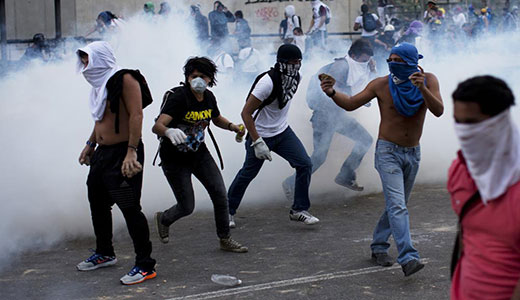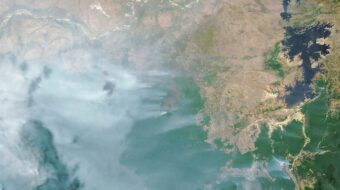
With violent anti-government protests continuing in Venezuela since early February, Florida Republican Rep. Elena Ros-Lehtinen introduced a resolution entitled “Supporting the People of Venezuela as They Protest Peacefully for Democracy, a Reduction in Violent Crime and Calling for an End to Recent Violence.”
On Mar. 4 Congress approved Resolution 488 by a 393-1 margin. All House Democrats gave assent except for seven who, with 29 Republicans, did not vote. A procedure called “suspension of the rules” was in force. It’s used for “legislation of non-controversial bills.”
Realities in Venezuela contradict the resolution’s assumptions. House members following Ros-Lehtinen’s lead were blind to the truth, or disregarded it. More importantly, they signaled congressional approval for expanded U.S. hostilities against Venezuela’s current government.
The idea of Venezuelans “protesting peacefully” reflects media bias. In fact, as protests mounted in early February in Táchira, Mérida, and Caracas, the police didn’t intervene until government offices and officers were attacked or burned or until food and medical supply trucks were waylaid.
As of Mar. 7, Venezuelan security forces had killed three people, one a government supporter. Opposition protesters had shot five people dead, three of whom were National Guard soldiers. Opposition roadblocks caused six additional deaths and indirectly led to 30 more deaths of people unable to reach emergency services. Despite all of this, the government arrested intelligence officers violating orders not to confront protesters
Foreign and domestic media have misrepresented protesters’ backing and their identity. Protests play out mainly in 18 of 335 municipalities, all inhabited by middle and upper class Venezuelans and governed by opposition politicians. Protesting students generally attend private universities. Polling in 13 states showed that 85.5 percent of respondents disagreed “with protests continuing throughout the country.”
Nor is democracy in Venezuela as scarce as the resolution suggests. Venezuelan governments of the past 15 years have won 17 out of 18 national elections. The experienced U.S. Carter Center says Venezuelan elections are “the best in the world.” And press freedom thrives. Most newspapers are privately owned and support the opposition. Private broadcasters command 90 percent of the TV viewing audience.
A democracy ought to promote the good of all. In Venezuela, poverty dropped from 50 percent in 1998 to 32 percent in 2011. Social spending as a percent of GDP increased from 11 percent to 24 percent. Pension recipients rose from 500,000 to 2.5 million; college graduates, from 600,000 to 2.3 million. Secondary school enrollment increased 42 percent. Childhood malnutrition and infant mortality fell dramatically. Each year the minimum wage increased by 10 – 20 percent.
Perhaps House members’ awareness of U.S. meddling in Venezuela forced their hand. Analyst Mark Weisbrot documents financial aspects: “About $90 million in U.S. funding to Venezuela since 2000 … including $5 million in the current federal budget.” Another report indicates, “Over one third of U.S. funding, nearly $15 million annually by 2007, was directed towards youth and student groups …to mobilize political activism.” And, “Embassy cables also reveal U.S. government funding of opposition parties.” Discussing his leadership of the National Endowment for Democracy, a prime source of U.S. funding, Allen Weinstein told the Washington Post in 1991 that “a lot of what we do today was done covertly 25 years ago by the CIA.”
House members knowing that anti-Venezuelan terrorists have long found safe haven in and around the congresswoman’s Miami home turf persevered in backing her resolution. Cuba-born Robert Alonso, for example, escaped to Miami in 2004 after Venezuelan authorities discovered 153 Colombian paramilitaries lodged at his farm near Caracas. Wearing Venezuelan army uniforms, they were planning to assassinate President Chavez. Alonso participated in the U.S.- supported coup attempt against Chavez in 2002.
On Feb. 23 Alonso hosted a “patriotic lunch” at his successor farm outside Miami. He sought “the help and solidarity of unyielding Cuban exile combatants in their campaign to augment resistance to [President] Maduro’s misrule.”
Reinol Rodríguez, “military chief” of the Alpha 66 paramilitaries, was on hand. José Dionisio Suárez, self-confessed assassin of former Chilean foreign minister Orlando Letelier, was there. So too was anti-Cuban terrorist Armando Valladares, implicated in a violent plot to overthrow Bolivian President Evo Morales.
Another meeting dedicated to overthrowing Venezuela’s elected government took place in Miami in 2009. Present were Venezuelan exile Patricia Poleo, linked to the assassination in 2004 of prosecutor Danilo Anderson and former Venezuelan army officer Gustavo Diaz, Pedro Carmona’s accomplice in attempting to overthrow Chavez in 2002.
Other anti-Venezuelan terrorists living in Miami include: Jose Antonio Colina Pulido, implicated in embassy bombings in Caracas in 2003; Raul Diaz Peña, jailed in Venezuela for the same crimes; former Venezuelan intelligence chief Joaquim Chaffardet, partner in crime with terrorist Luis Posada (living in Miami); and Johan Peña, accused of killing Danilo Anderson.
After escaping from prison in 2010, Raul Diaz Peña first appeared in public in Rep. Ros-Lehtinen’s Miami office. Reporters learned that the fugitive’s escape and U.S. entry had cost $100,000. Ros-Lehtinen admitted she “had been lobbying the U.S. government to bring the convicted terrorist to the U.S.”
Congresspersons voting for Ros-Lehtinen’s resolution probably knew at least some of these truths beforehand. In backing Ros-Lehtinen’s resolution despite all, they provided official verification for an amplified U.S. campaign to undermine Venezuela’s government. They were thereby joining forces with Sens. Marco Rubio, R-Fla., and Robert Menendez, D-N.J., who had already called for economic sanctions against the Venezuelan government.
Photo: Violent protests – as seen here – by right-wing opponents of the Venezuelan government have led to the deaths of numerous supporters of the government. Rodrigo Abd/AP












Comments